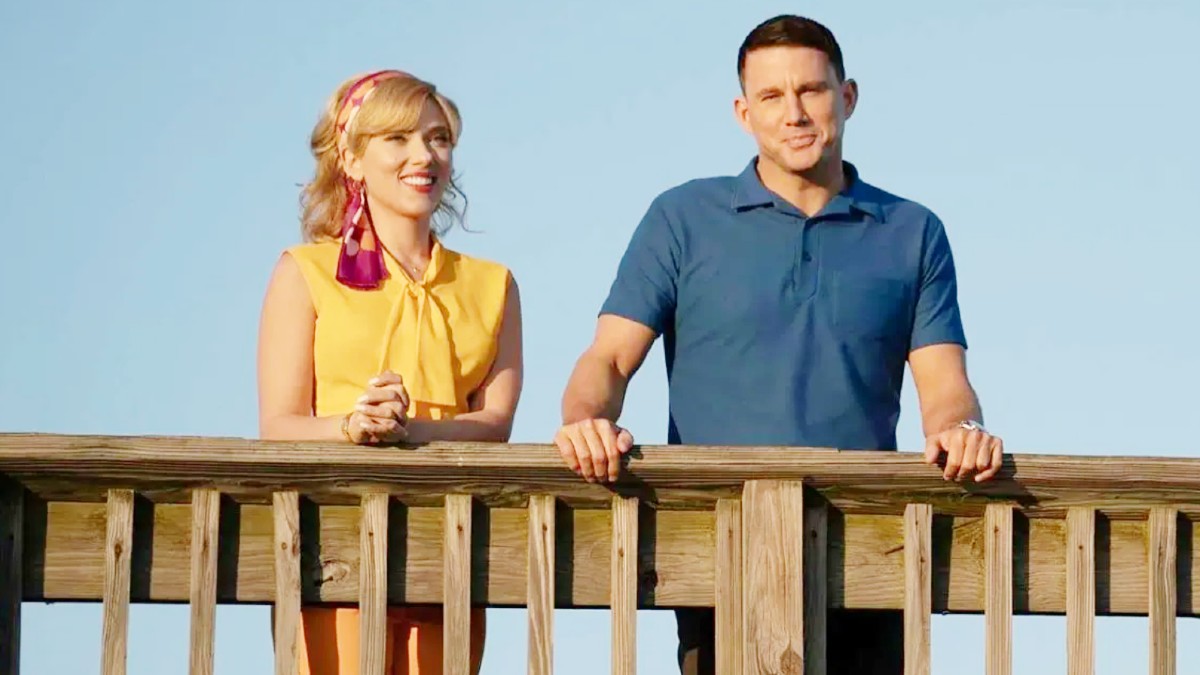Romantic comedies are always, on some level, having a moment. But usually, these moments involve doubling down on a sort of laughingstock reputation; there’s a reason the words “Hallmark” and “Netflix original” are often used as pejoratives when discussing such a genre, and when you pair that with the snideness of internet film culture, it’s hard to not associate rom-coms with dire creative straits.
But recently, rom-coms have been having a moment that the genre has greatly desired; Anyone But You had a mirthfully cheer-worthy box office run, while The Idea of You spread its Anne Hathaway-enabled wings magnificently on Prime Video. All that was missing was a big, summertime, rom-com knockout.
Enter Fly Me to the Moon, the Greg Berlanti-directed, Scarlett Johansson-led/produced period piece that just began its theatrical run this past weekend, and we’d all do well to tune in with the same gumption that American citizens did with the Moon landing many decades ago. Indeed, with a witty script from Rose Gilroy, a markedly intelligent understanding of both romance and comedy, and Johansson being Johansson, Fly Me to the Moon sticks the landing wonderfully, and is sure to draw a space station’s worth of folk to Team Studio Rom-Com.
Set during the 1960s Space Race, the film stars Johansson as Kelly Jones, a marketing specialist recruited by NASA to fix the organization’s public image in hopes of drawing moral and financial support from the many corners of the United States. This endeavor draws the ire of Cole Davis (Channing Tatum), the director of the Apollo 11 mission who’s frustrated by NASA’s lack of funding, and believes the fact of Apollo 11’s ambition is all the justification they need. Nevertheless, the pair find themselves working together towards a common goal and are both only peripherally aware of the sparks that are about to fly between them.

If there was still any doubt prior to Fly Me to the Moon that you should never, ever bet against Scarlett Johansson, that should all be extinct by now. Indeed, the actress has long since proven to be a top-class influence on everything she touches (be it a Noah Baumbach flick or a Marvel Cinematic Universe entry), and her turn as Kelly positively oozes artistic joy. She’s at once a stellar conduit for the film’s snappy relationship to humor and navigates her share of its innate humanity with profoundly subtle honesty. It’s simply splendid work from Johansson, whose screen presence is felt just as much as her producer’s touch here.
Meanwhile, Tatum and Jim Rash (the latter of whom portrays Lance Vespertine, the haughty film/television director that Kelly recruits to helm their top-secret fake Moon landing footage) are both dashingly entertaining, but they owe a fair shake of their mileage towards Berlanti’s direction. You can almost see the game of directorial chess that Fly Me to the Moon‘s prolific gaffer was playing here throughout; he knew how to maximize Tatum’s physicality and penchant for sensitivity, and he knew precisely what he was doing by slotting Rash — complete with his black belt in the art of sass — into his film the way he did. Indeed, much like the real-life Apollo 11 mission, there were 400,000 choices that needed to be made, and Berlanti made the correct one every time (with ample help from this acting trio, of course).
But it would have been all for naught if Fly Me to the Moon were burdened by a lazy script. Luckily, the film had one Rose Gilroy for a screenwriter, and what a privilege it must be to bear the distinction of the scribe’s first feature screenwriting credit. It only very occasionally strains to get through some of its textual and subtextual beats, but the overwhelming majority of the film’s runtime is loaded with charming dialogue, minimal meandering, and a storytelling identity that simultaneously puts all of its effort on full display, and yet makes it all look so effortless. Gilroy’s is a writing wisdom to be admired, and we’d all be similarly wise to keep an eye on her career from here on out.

Speaking of storytelling identity, the core victory of Fly Me to the Moon is its understanding that Kelly and Cole’s relationship is set-dressing to the world around them, rather than the other way around. Most may feel compelled to label the pair’s attraction to one another as somewhat contrived and shallow. That’s because it is, and that’s by design. Fly Me to the Moon‘s endgame isn’t Kelly and Cole; it’s the beauty that we, as fundamentally flawed humans, are capable of inhabiting and bearing witness to.
Kelly Jones; a serial fibber who has very few qualms about distorting the perceptions of both her immediate acquaintances and audiences across America so long as it gets her what she wants? Yes, and also a confident, charismatic go-getter who’s capable of rousingly colorful emotion, and whose fascination for her fellow human beings — humble anecdotes and all — causes her to glow.
Cole Davis; an ex-military pilot who failed his astronaut test and is now aggressively hellbent on finding success with the Apollo 11 mission for the sake of proving something and relishing in the achievement? Yes, and also a compassionate and capable leader who’s willing to pull out all the stops to make sure that the deaths of the Apollo 1 team will never be in vain, and whose honor he wishes to instill in the awe-inspired citizens of the country he fought for.
The Moon landing; a severely egotistical endeavor in light of all the other goings-on in 1960s America and abroad, as well as a grossly insincere advertisement enterprise? Yes, and also a lynchpin of human achievement, whose potential to inspire and capture our collective sense of wonder speaks for itself.
All this to say that Fly Me to the Moon quite masterfully ping-pongs between all that Kelly is, all that Cole is, and all the Moon landing — and, by extension, mankind — is. The way it extrapolates the beauty of them without shoving the messiness to the side is paramount to a great romance film, as is its focus on emotional human potential (both macro and micro) rather than when Kelly and Cole are going to kiss. Its comedic chops, meanwhile, manifest via the very lived-in, very sturdy, and very cooperative characterization; the raw humor that each character brings to the table is unique, but the dynamics between the characters constantly filter that humor onto a naturalistic united front that earns every smile, chuckle, and guffaw.
And for every moment that Fly Me to the Moon does lose its grip on its magic (most notably during the third act), there are five or six others where its delightfulness triumphs resolutely, and Johansson and company can quite confidently chalk this one up as a liftoff.

